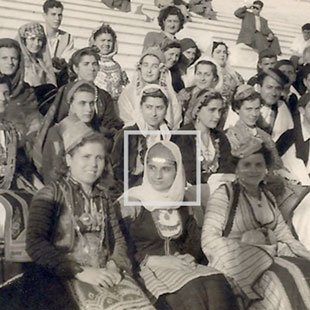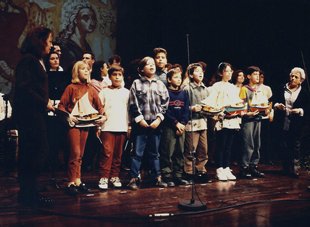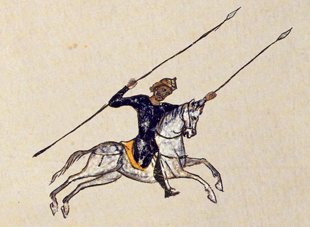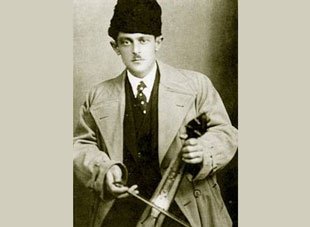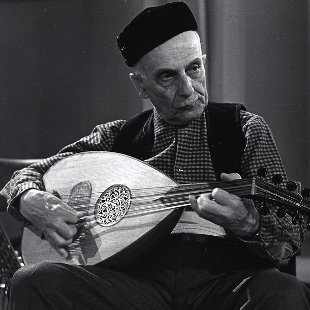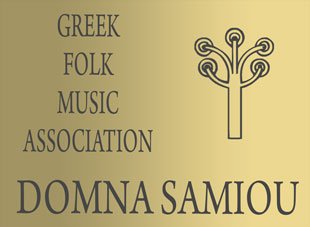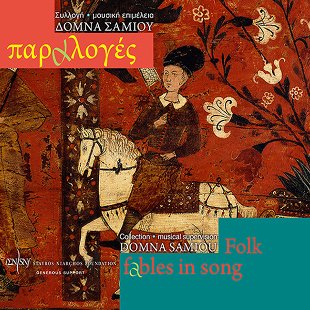You are at: Home page Her Work Discography Folk Fables in Song
Contents
In fables, fragments of ancient myths are preserved. On this CD, Domna Samiou & her collaborators sing tales of the fabulous and the fantastic combining the real world with the supernatural and narrating stories, often tragic, which might once have occurred – or could do so one day – however imaginative they seem. The CD contains rare and priceless songs with the authentic voices of ‘old people’, which Domna recorded herself in situ.
(barcode: 5204910001323)
CD 1
-
1. A Trader Made His Way
Eastern Aegean More
-
2. Four, Five, Nine Brothers
Epirus More
-
3. The Dead Brother
Asia Minor More
-
4. The Dead Brother
Eastern Thrace & Roumelia More
-
5. A Maid Would Have Her Way
Propontis More
-
6. The Song of Saint George
Propontis More
-
7. Arta’s Bridge
Sporades More
-
8. At Trichas’ Bridge
Pontus More
-
9. In Constantinople I Heard the News
Thrace More
-
10. The Glass Well
Central Greece More
-
11. Giorgi, They’re Ringing the Bells
Peloponnese More
-
12. One Easter Day, One Sunday
Thrace More
-
13. A Mother Has a Son
Thrace More
-
14. I Passed by and Bade Good Day
Eastern Thrace & Roumelia More
-
15. Little Apple Tree Perched on the Brink
Constantinople More
-
16. On Saint George's Eve
Propontis More
-
17. A Maid from Evripο
Asia Minor More
CD 2
-
1. A Maid Was Singing
Propontis More
-
2. A Maid Bidding Farewell
Crete More
-
3. Dawn Glowed in the East
Propontis More
-
4. A Maid from Vrontados
Asia Minor More
-
5. Giannos and Vangelio
Epirus More
-
6. As Long as the Shore
Propontis More
-
7. No Father Had I
Eastern Thrace & Roumelia More
-
8. A Prince Is to Be Wed
Propontis More
-
9. With Child A-Mowing
Eastern Aegean More
-
10. A Fair Maid Did Sing
Central Greece More
-
11. Mavrianos and the King
Crete More
-
12. Aroafnou
Cyprus More
-
13. Fair Evgenoula
Thrace More
-
14. Three Lords A-Sitting
Cappadocia / Konya More
-
15. Yar Yar
Pontus More
-
16. A Little Shorty (Meli, Erythrae)
Asia Minor More
-
17. A Little Shorty (Skiathos)
Sporades More
- Production: Domna Samiou Greek Folk Music Association
- Year of release: 2008
- Type: CD
- Sponsors: Stavros Niarchos Foundation
Notes
The songs included date from three different recording eras. Meaning that, apart from the songs my associates and I recorded in the studio, there are others sung by simple folk I met long ago on my travels around Greece.
And though these latter recordings are far from perfect, these songs surely impart more of their singular atmosphere and style to the listener when sung in the authentic voices of the people. Lastly, to give as full a picture as possible, we have also included songs from previous Association releases.
I hope the results will prove pleasurable and rewarding.
Domna Samiou (2008)
And these songs, centuries-old and with everything in them, are what we call ‘fables’. The range of myths, and the inventiveness with which their component parts are added, removed, adapted, transferred, combined and reworked, is staggering. In fact, it is this ongoing process of recreation that has kept these songs fresh down the centuries, kept their tales of sprites and princesses relevant, their kings and viziers contemporary, their Saints George and Turks modern-day foes.
Having grown further and further removed from their historical ‘roots’, these songs serve as musical myths whose subject-matter expresses collective representations. As such, they allow every group and generation to imbue them with new meanings of their own or old meaning they have rendered comprehensible again, and –through their singing– to express the needs of their present.
Along with dirges and Carnival songs, these sung, metrical fairytales lie closest to the point at which the complex outer world of ‘events’ intersects with the dark inner world of desires and fantasies. Which is why fables are sung in a spirit of meditative joy at Carnival feasts, and as dirges lamenting specific or symbolic dead. They are sung and danced in ways revealing the tales which they relate –as slow unaccompanied table songs sung to a monotonous, repetitive melody, or as slow, ritualistic dances at weddings or the great Spring feasts– to teach and bring relief as best they can to the community on those key occasions on which it convenes, remembers, and bonds anew.
Fables were often not sung at all, but recited like fairytales at get-togethers to the rhythms of everyday speech. The audience would have identified with the tragic tales and often wept as they listened. The singers/narrators –folk equipped with artistry, taste, an excellent memory and a knowledge of history, psychology and social rules– had no qualms about intervening in the songs they sang, instinctually matching names, places, secondary narrative strands and details of every sort to their audience’s codes and inner needs. Which is how the songs came to be imbued with new dimensions which would be readapted in perpetuity to every new context in which they came to be sung.
The often extreme events they relate helped listeners incorporate the supernatural into their rational view of the world, and by extension into the irrationality of their subconscious minds. The lack of demarcation between the wild world of exotic lands, plants, animals/creatures on the one hand and the tame, humanized world of livestock, crops and civilized human society on the other helped the audience mentally to bridge the realms of fantasy and reality. And as they gradually came to accept that threatening sprites are an integral part of life, they could also accept as part and parcel of existence those unpleasant, unacceptable, ineffable feelings which can lead to conflict even within the sanctuary of the family; conflicts every member of society had to be equipped to deal with.
Concealed behind their poetic, symbolic language and the fantastical things they describe, the songs actually table painful conditions of human existence: Oedipal conflicts, being deprived of a mother’s love or a father’s protection, incestuous desires, unconfessed hatred between siblings, painful progressions to adulthood, social dictates, materialistic compulsions, ethical dilemmas and ambivalence are all transformed into more or less acceptable realities whose impact is softened by the redemption provided by the dramatic tales sung in fable form over the centuries.
Traditions can exist only as long as they continue to serve and express the interests –communal and individual– of the given social group that embraces and conveys them. An integral part of every aspect of life in traditional communities and equivalent to –or even a substitute for– various social functions ranging from recreation and education to artistic expression, ritual discourse and moulding a collective memory/identity, the songs’ impressive adaptability allowed them to express unwritten social laws and codes, values and fears. And because, as long as people feel the same, they will seek similar ways of externalizing their feelings, they will go on, even today, in certain contexts creating new songs for new audiences on old themes. With their new meaning bestowed on them by lived historical –and arbitrarily imaginary– reality rather than by History, these songs are empowered to express emotional, social and even national tensions, to defuse them, and to cure them with that intangible medicine known as discourse.
Miranda Terzopoulou (2008)
Credits
Production team
- Domna Samiou (Research, Collection, Musical supervision),
- Socrates Sinopoulos (Musical supervision),
- Daphne Djaferis (Production management),
- Tasia Papanikolaou (Production assistant)
Sound team
- Charalambos Blazoudakis (Sound engineer),
- Yiorgos Karyotis (Sound engineer),
- Kostas Prikopoulos (Sound engineer),
- Yannis Sygletos (Sound engineer),
- Yiorgos Karyotis (Sound editing),
- Petros Siakavellas (Sound editing),
- Socrates Sinopoulos (Sound editing)
Booklet team
- Miranda Terzopoulou (Texts and commentaries),
- Michael Eleftheriou (English translation),
- John Leatham (English translation),
- Natassa Papadopoulou (Text Editing),
- Konstantina Ananidi (Design and layout),
- Christina Katsichti (Design and layout),
- Marina Orfanidou (Design and layout),
- Thomas Papanikolaou (Design and layout)
Singer
- Domna Samiou (Fair Evgenoula, A Little Shorty (Skiathos), A Fair Maid Did Sing, A Maid Would Have Her Way, A Maid from Evripο, A Trader Made His Way, A Maid Was Singing),
- Angeliki Goudi and Styliani Lykou from Kalamoti (Chios) (With Child A-Mowing),
- Soultana Bogri (As Long as the Shore),
- Vangelis Dimoudis (The Dead Brother, I Passed by and Bade Good Day, No Father Had I),
- Vassiliki Dokidou (A Mother Has a Son),
- Lambros Goumenos (Giannos and Vangelio),
- Babo-Vagia Grammenidou (One Easter Day, One Sunday),
- Zacharias Karounis (Little Apple Tree Perched on the Brink),
- Maria Kouskousi (A Maid from Vrontados),
- Antonis Martsakis (A Maid Bidding Farewell, Mavrianos and the King),
- Katerina Papadopoulou (A Prince Is to Be Wed, The Glass Well, A Little Shorty (Meli, Erythrae)),
- Spyros Tsoukatos (Giorgi, They’re Ringing the Bells),
- Michalis Tterlikkas (Aroafnou),
- Yiorgis Tzoumas (Arta’s Bridge),
- Women's Group from Nea Palatia (Oropos, Attiki) (On Saint George's Eve, The Song of Saint George),
- Ilias Yfantidis (At Trichas’ Bridge),
- Christos Zafiroudis (In Constantinople I Heard the News),
- Michalis Zambas (Four, Five, Nine Brothers)
Choir
- Domna Samiou Greek Folk Music Association Choir (Dawn Glowed in the East, A Little Shorty (Skiathos), A Fair Maid Did Sing, Three Lords A-Sitting, A Maid from Evripο),
- Women's Group from Meli (Megara, Attiki) (The Dead Brother)
Clarinet
Flute
- Alexandros Arkadopoulos (A Prince Is to Be Wed, A Maid Would Have Her Way, A Little Shorty (Meli, Erythrae))
Kaval
- Alexandros Arkadopoulos (Fair Evgenoula, The Dead Brother, I Passed by and Bade Good Day, No Father Had I)
Gaida (bagpipe)
Violin
- Nikos Oikonomidis (A Little Shorty (Skiathos), A Fair Maid Did Sing, Four, Five, Nine Brothers, The Glass Well, Little Apple Tree Perched on the Brink, A Maid from Evripο, A Trader Made His Way)
Tsumbus
Constantinopolitan lyra
- Socrates Sinopoulos (Dawn Glowed in the East, Fair Evgenoula, No Father Had I, A Maid Would Have Her Way, A Little Shorty (Meli, Erythrae), A Maid Was Singing)
Pontic lyra
Kanun
- Agnes Agopian (A Maid Was Singing),
- Panos Dimitrakopoulos (Dawn Glowed in the East, A Prince Is to Be Wed, Fair Evgenoula, A Maid Would Have Her Way, A Little Shorty (Meli, Erythrae), A Trader Made His Way)
Bowed tambouras
Constantinopolitan lute
- Socrates Sinopoulos (A Little Shorty (Skiathos), A Fair Maid Did Sing, The Dead Brother, No Father Had I, The Glass Well, Little Apple Tree Perched on the Brink, A Maid from Evripο, A Trader Made His Way)
Oud
- Antonis Apergis (A Maid Was Singing),
- Kyriakos Tapakis (Dawn Glowed in the East, A Prince Is to Be Wed, Fair Evgenoula, A Maid Would Have Her Way, A Little Shorty (Meli, Erythrae), Yar Yar)
Lute
- Kostas Papaprokopiou (A Prince Is to Be Wed, A Little Shorty (Skiathos), A Fair Maid Did Sing, Four, Five, Nine Brothers, Little Apple Tree Perched on the Brink, A Maid from Evripο),
- Kostas Philippidis (The Glass Well, A Trader Made His Way)
Ney
Daouli (davul)
Goblet drum
- Vangelis Karipis (Dawn Glowed in the East, A Prince Is to Be Wed, A Little Shorty (Skiathos), A Fair Maid Did Sing, A Maid Would Have Her Way, Little Apple Tree Perched on the Brink, A Maid from Evripο),
- Manousos Klapakis (The Dead Brother, No Father Had I)
Bendir (frame drum)
- Vangelis Karipis (Fair Evgenoula, A Little Shorty (Meli, Erythrae), A Trader Made His Way, Yar Yar),
- Andreas Pappas (Three Lords A-Sitting)
Tambourine
Zil bells
Spoons
Informant (source of the song)
Informant (source of the song)
- Angeliki Goudi and Styliani Lykou from Kalamoti (Chios) (With Child A-Mowing),
- Lambros Goumenos (Giannos and Vangelio),
- Babo-Vagia Grammenidou (One Easter Day, One Sunday),
- Yiorgos Kambouriannidis (Yar Yar),
- Maria Kouskousi (A Maid from Vrontados),
- Sotiris Krissilias (A Fair Maid Did Sing),
- Zoe Lionti (Dawn Glowed in the East, A Prince Is to Be Wed),
- Yannis Parisis (A Little Shorty (Skiathos)),
- Vasiliki Pepe (Three Lords A-Sitting),
- Traiani and Theodor Pitsanis (The Dead Brother, I Passed by and Bade Good Day, No Father Had I),
- Eleni Stratoudaki-Lazopoulou (Three Lords A-Sitting),
- Eleni Tsakiri (A Maid Would Have Her Way),
- Spyros Tsoukatos (Giorgi, They’re Ringing the Bells),
- Yiorgis Tzoumas (Arta’s Bridge),
- Christos Zafiroudis (In Constantinople I Heard the News)
References

Folk Fables in Song Is a Timeless Project

Expressive Paraloges on a New Double CD by Domna Samiou
Member Comments
Post a comment
See also
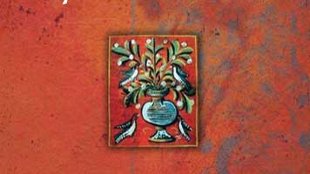
Song
A Fair Maid Did Sing
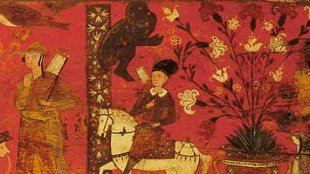
Song
A Little Shorty (Skiathos)

Song
A Maid Bidding Farewell

Song
A Maid from Vrontados

Song
A Trader Made His Way
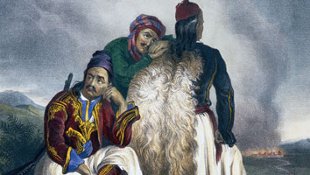
Song
All the Castles I Have Seen

Song
Arta’s Bridge

Song
Dawn Glowed in the East
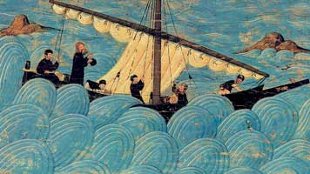
Song
Down on the Sandy Beach

Song
Evyenoula
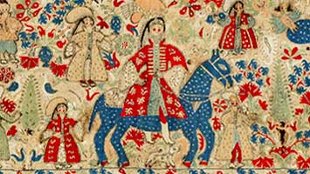
Song
Fair Evgenoula

Song
Forty Stonemasons

Song
On Saint George's Eve

Song
Somewhere in the Aegean Sea


